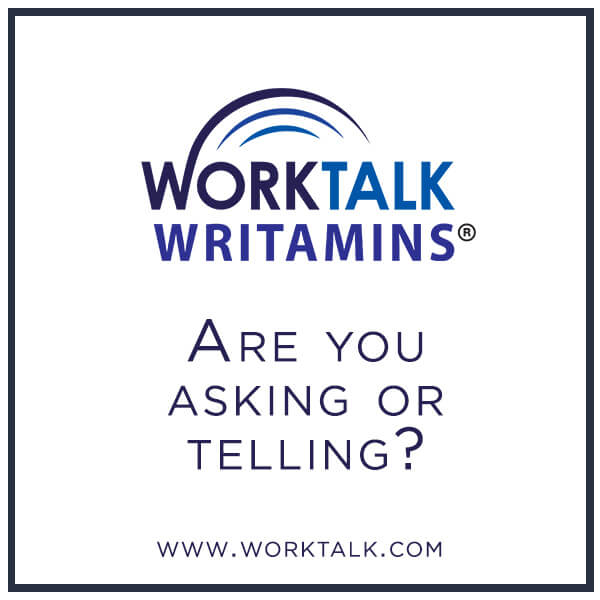[4 minutes to read]

How using the wrong punctuation can create confusion.
“Can you schedule a meeting with me and Bob.”
“Will you let me know when you find out.”
“Could you send me one right away.”
Have you seen sentences like these before? What do you notice? Of course, the questions are missing the question mark. Question marks end questions. We all learned this in school, but in business, the question mark often falls off the end of the question and we are left with these half-requests that are punctuated incorrectly.
But are they?
Harold, a business executive, learned something about his personality by analyzing his punctuation. recently His company has been a Worktalk client for many years, and Harold recently decided to seek coaching for himself.
As an executive, he communicates extensively with his staff and customers. Harold prides himself on being a gentle fellow. He is the boss, but he doesn’t want to seem bossy. His emails are replete with sentences like the ones above. It drives his fellow managers crazy. “Why don’t you end a question with a question mark?” they fume.
In Harold’s coaching session, the truth emerged. He wants to be nice…. hence the interrogative phrasing of “Can you…” “Would you…”. But he knows he is actually not asking a question. He is giving an order. That’s why he puts a period at the end of the sentence. So, in a way, what he is doing makes perfect sense. He feels he is giving instruction in a softer way. In his coaching session, I pointed out that this is more of a management style than a punctuation style.
Except that it is grammatically wrong and distracts some readers from the content of his message. I advised him that he need not choose between his two personas. He can give orders and follow up with a pleasant expression of appreciation for the staff person’s assistance.
The Distinction Between Requesting and Instructing
Harold’s confusion is understandable when we realize that questions and instructions both have the same purpose: To request. An instruction is a request with teeth. Grammatically, the difference is that questions end with question marks and instructions end with periods. What is the difference between these two sets of statements?
| Question with Question Mark | Instruction with Period |
| Can you schedule time? | Please schedule time. |
| Could you let me know? | Please let me know. |
| Would you please tell me when the meeting is? | Please let me know when the meeting is. |
The desired result is the same: Schedule time. Tell me what I need to know. It’s a question of how you get what you want. In previous Writamins, we have written about the Three P’s: purpose, person, and point. Here we have a case when the purpose is to request but you have two ways of achieving it, by questioning or by instructing.
Should you ask or tell?
You decide on a case-by-case basis whether you will ask a question or give an order. If you are willing to accept no for an answer and you want to seem tentative and nice, you may opt for the question and end it with a question mark.
However, if “no” is not an option, don’t kid people by appearing to ask a question. You are not really asking a question. You are telling the person what to do. So man up… or woman up… or person up… and give an instruction. And end it with a period.
©2019 Elizabeth Danziger All rights reserved
BOOK YOUR CONSULTATION NOW Communication woes drag down productivity and morale. Book your free 30-minute “communications audit” consultation with Elizabeth Danziger. She will listen to your situation and suggest ways to improve communication in your organization right away. Contact her at lizd@worktalk.com or 310.396.8303. You can also book through www.calendly.com/worktalk.
